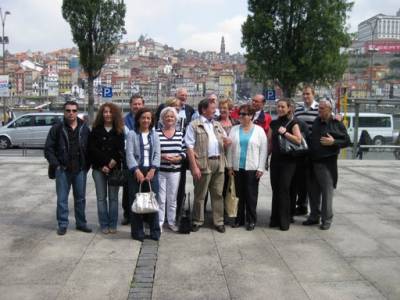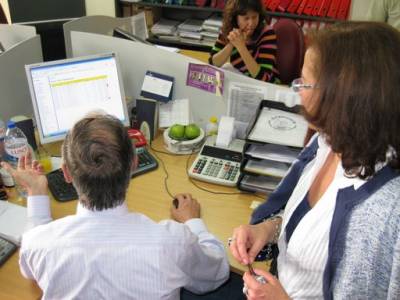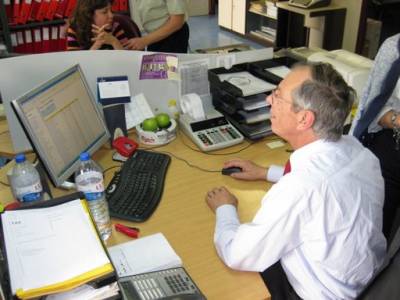OEAN & UECBV - When Two Worlds Align For European Integration
The Story Behind a 15-Year Strategic Partnership of UECBV with OCEAN
Former Secretary General of OCEAN and UECBV reflects on 15 years of impactful collaboration between the two organisations from 2005 to 2019, highlighting shared priorities in meat trade, veterinary policy, and customs facilitation.
In 2004, a proposal arrived unexpectedly—from a sector I hadn’t yet crossed paths with. It came from a European association representing ship suppliers: OCEAN. What followed was a 15-year collaboration built on shared interests, complementary strengths, and a mutual goal to improve conditions for cross-border trade across the EU. This is the story of how an unexpected outreach grew into a long-standing partnership that continues to deliver value today.
A Surprising Introduction
In October 2004, I received one of the most unexpected proposals of my career: a cooperation request from an organisation I hadn’t worked with before—OCEAN, the European ship suppliers association.
Their Chair at the time, Michel Van Hulle, who also led a ship supply company in Antwerp, contacted me directly. Our areas of activity seemed unrelated on the surface—OCEAN served the ship supply sector; I was Secretary General of the UECBV, the European association for the livestock and meat trade. Yet, something in their message piqued my interest.
Finding Common Ground
What started as curiosity quickly turned into recognition of genuine alignment. Both OCEAN and UECBV were composed largely of agile, family-run SMEs operating across EU borders. Both were deeply invested in the success of the Single Market. And both saw the modernisation of the Customs Union and effective EU trade policy as essential to their members’ futures.
At the core, we shared a similar mindset: practical, cross-sector collaboration to support fair, efficient trade within the European Union.
Why OCEAN and UECBV Work Well Together
The meat and livestock trade is more connected to the ship supply industry than many realise. Supplying EU and third-country meats to vessels and cruise ships is part of OCEAN members’ daily business. This makes veterinary rules and health controls a shared area of concern—and one where both associations consistently advocate for clear, enforceable, and workable regulation.
At the same time, OCEAN brought additional strengths to the table, particularly in customs, VAT, excise, and indirect taxation. Through OCEAN’s active involvement in the Trade Contact Group of DG TAXUD and its strong ties to the Commission’s customs and tax departments, we were able to tap into early insights on regulatory developments that often have knock-on effects for the broader food trade.
This exchange of expertise between our associations improved the understanding of operational realities across both sectors—and ensured smoother import and export conditions for our shared interests, particularly in meat delivery to vessels.
During my time as Secretary General, OCEAN’s integration into UECBV proved to be a highly effective and complementary partnership.
From Agreement to Structured Alliance
These synergies led to a formal partnership in January 2005, beginning with a service agreement and evolving into OCEAN’s full membership within UECBV. Crucially, OCEAN kept full independence and its distinct identity.
What made this model unique was OCEAN’s dual secretariat: one office in London, led by Spencer Eade until 2019, and one in Brussels under my direction until the same year.
Clarity, Coordination, and Reach
The London secretariat managed administrative, financial, and communication tasks, including website development and coordination with ISSA (International Ship Suppliers & Services Association). The Brussels office focused on strategic representation within the EU: monitoring policy files, drafting technical input, setting shared priorities, and facilitating communication with both EU-level and national players.
This structured split created both agility and reach—allowing OCEAN to contribute effectively across all relevant areas.
Raising Visibility for a Specialised Sector
From the outset, it was evident that the ship supply sector lacked visibility in Brussels. Yet their work is anything but marginal: fast-paced, high-pressure, and shaped by unique legal and logistical constraints.
To raise awareness, we developed a concise brochure and built a dedicated website to explain the profession and its value to the EU economy. This clear identity helped OCEAN gain the recognition it deserved.
A Focused Policy Agenda
With its foundations in place, OCEAN worked with us to develop a coherent policy strategy. Together, we prioritised:
-
Modernisation of the EU Customs Code
-
Full digitisation of customs procedures
-
Reform of VAT and excise regimes
-
Safe and efficient procedures for import, transit, and transhipment of foodstuffs
-
EU Veterinary Law Modernisation
These issues not only reflected member concerns—they aligned with broader EU goals of simplification, security, and market efficiency.
A Seat at the Table
OCEAN’s structured, evidence-based approach began to deliver results. Over time, EU legislation started to reflect the realities of the ship supply sector.
Recognition came in the form of formal involvement in several key Commission expert groups, including:
-
The Customs Code Committee
-
The Electronic Customs Committee
-
The Trade Contact Group
-
The Excise Contact Group
These platforms enabled OCEAN to provide targeted feedback and technical clarity on fast-evolving topics—contributing meaningfully to the development of workable policy.
People Behind the Progress
A partnership like this only works when there’s trust, expertise, and committed leadership.
I’m deeply grateful to the four Chairs of OCEAN I had the privilege to work with—Michel Van Hulle, Stefan Ericson, Alfredo Tosato, and Dirk Cupido. Each brought unique strengths but shared a common confidence in UECBV and a clear vision for what OCEAN could achieve.
The contributions of OCEAN’s technical experts were equally vital. Many made time to engage with complex files, despite the demands of running their own businesses. And none of this would have been possible without the UECBV team in Brussels, whose dedication made this cooperation a success.
Looking Back—and Forward
As Dirk Cupido once said, paraphrased:
I had the honour of witnessing OCEAN’s 40th anniversary—and its 50th. I hope the association continues to grow and make its mark in the decades ahead.
Happy Anniversary OCEAN




